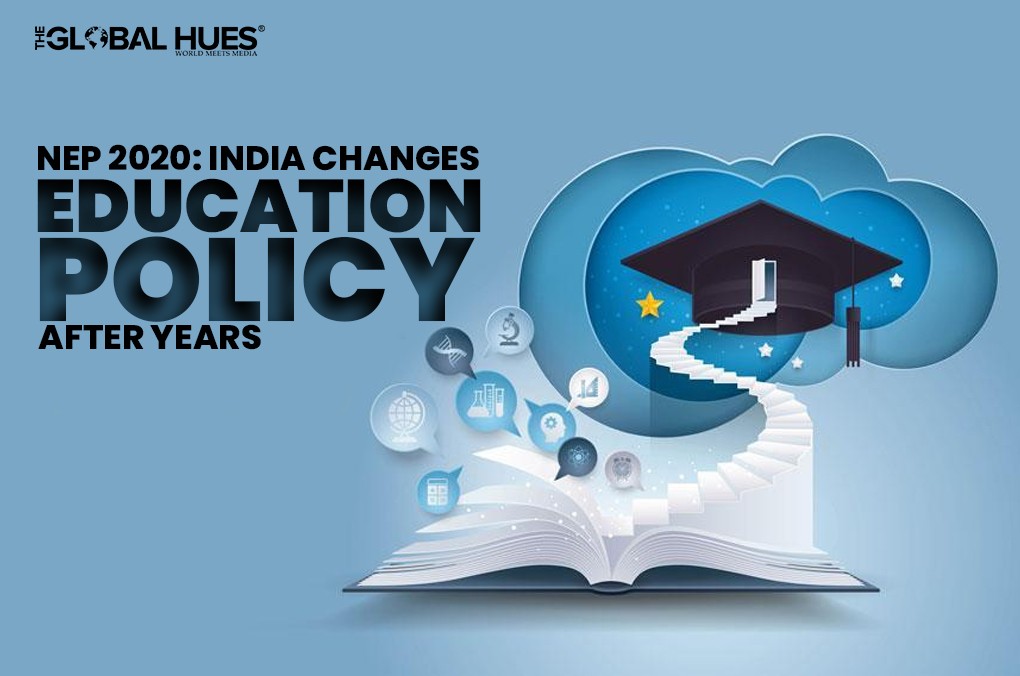Education is fundamental for achieving the overall development of an individual and promoting national development. India has a significant population of young people who can promote the country’s growth if they are provided with high-quality educational opportunities. The education policy of India have focused on the same concept. They aimed to provide good education to people so that they can think rationally, become courageous, creative, and respect ethics and moral values.

NEW EDUCATION POLICY 2020
New Education Policy has been introduced in July 2020. Prakash Javadekar, the Union Ministry for Information and Broadcasting (I & B) and Human Resource Development ministry replaced a 34-year-old National policy of Education with the New Education Policy of 2020.
It has been said that the policy has been drafted by keeping in mind the needs of future generations. This policy has almost changed all aspects of education. It tries to focus on the development of each and every person in a more creative and planned manner.
WHAT PURPOSE DOES NEP SERVE?

New Education Policy is a framework that guides the development of education in the country. It aims to provide a quality education system to all irrespective of their place of residence. It particularly focuses on disadvantaged and historically marginalized groups. The New Education Policy replaces the 1986 NEP which was in place for the last 34 years.
Here are some of the significant highlights of the New Education Policy 2020.
1. Blurring the lines between arts, commerce, and science
New Education Policy tries to blur the lines between three main streams i.e. Arts, Science, and Commerce. There will be no rigid separations. Under the system, students have the freedom of choosing different subjects of their choice thereby giving flexibility in their field of interest.
Furthermore, NEP has introduced a four-year undergraduate program with multiple entries and exit points. It means that students who are willing to exit after a year will be given a certificate. Likewise, students can take an exit with a diploma after two years, a Bachelor’s degree after three years, and a Bachelor’s with a research degree after four years. Therefore, this system ensures greater flexibility in the education system.
2. One higher body for higher education
There will be no UGC, AICTE, and NCTE. The New Education Policy brings higher education (except medical and legal education) under one body i.e. Higher Education Commission of India (HECI). The HECI will be responsible for handling the entire higher education. All private and public higher education institutions will be governed by the same set of instructions and regulations.
National Testing Agency (NTA) which currently handles major examinations like JEE Main, NEET, and UGC NET will now be responsible for conducting entrance examinations for higher education across the country.
3. Kids to get a formal education from age 3

Union Cabinet has introduced the Early Childhood Care and Education (ECCC) under which kids will get formal schooling from the age of 3. Kids of age between 3-6 years will receive pre-schooling as against the earlier system in which schooling was mandatory for children between 6-14 years of age. New Education Policy has introduced 12 years of schooling. The ECCE will be implemented in a phase-wise manner. The government has planned to complete this process by the year 2030.
Also, the earlier school curriculum was based on a 10+2 structure but it has come to an end. To focus on the early development of a child, NEP has introduced a new schooling structure of 5+3+3+4 corresponding to age 3-8, 8-11, 11-14, and 14-18 years respectively. This system aims at dividing the child’s education at different stages.
4. Special focus on one’s mother tongue
India is known for its cultural heritage. Nothing’s better than so many native languages to highlight that. One of the most striking points that came out from the New Education Policy is the focus on the mother tongue. The policy encourages to help the students to learn their mother tongue up to class 5, preferably up to class 8.
It clearly states that “Wherever possible, the medium of instruction until at least Grade 5, but preferably till Grade 8 and beyond, will be the home language, mother tongue, local language or the regional language.” It also says that no language will be imposed on the students but the teacher can teach in bi-lingual as children grasp complex concepts in a better way if taught in their home language.
5. Open doors to Global Universities
New Education Policy opens its door for global universities to allow global education in the country. It will give more opportunities to a child and he/she will get to learn more skills. This might be implemented in the form of new campuses, partnerships with universities in India. Many students who plan to go and study abroad will hopefully get to study higher education by living in India only.
6. Freedom to Choose Vocational Subject
According to this policy, the students between Grade 5-8 will have the freedom to choose one vocational subject. Furthermore, they will also have to intern with the local vocational institution after that. This amendment is trying to facilitate flexibility in the education system that will hopefully help children to follow their passion with more dedication and deep interest. They will become passionate about a particular subject.
So, a major and clear takeaway of this New Education Policy is that the child would no longer be judged based on marks as this also focuses on extra-curricular activities. It allows a student to choose a subject according to the field of interest and will help in building a strong profile.
IMPLEMENTATION
The government has set up a target of implementing the entire policy by 2040. The NEP can only provide a broad direction. The reforms proposed can only be implemented by the center and the state government together as the subject (education) falls under the concurrent list (both center and state make laws).
The government is planning to set up subject-wise committees at both center and state levels to implement the policy. They will make plans according to which actions will be taken by multiple bodies including HRD Ministry, NCERT, Central Advisory Board of Education, National Testing Agency, school boards, and other education departments. After the planning, a yearly joint review of progress will be done.
Also Read:
- On The Other Side Of Education Technology
- Affordable And Accessible Quality Education
- Online Education: Boon Or Bane For Special Kids
- Digital Learning: A New Era Of Education
- Kavita Sanghvi: An Ardent Educationist
- Impact Of COVID-19 On Early Childcare And Education
- A Growth Chart: Scanning India’s Education Sector From 1947 To 2023




